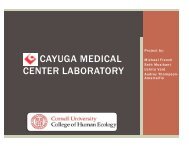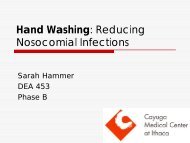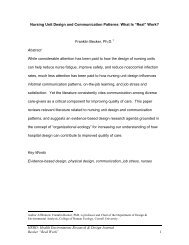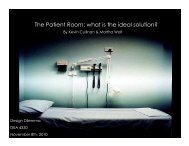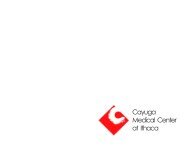The role of physical design and informal communication
The role of physical design and informal communication
The role of physical design and informal communication
You also want an ePaper? Increase the reach of your titles
YUMPU automatically turns print PDFs into web optimized ePapers that Google loves.
Interview Guide – Graduate Nurse<br />
Learning:<br />
1. At the beginning <strong>of</strong> orientation, with what skills did you feel most competent?<br />
Least competent? How did this change during the course <strong>of</strong> your orientation?<br />
2. We’re interested in how the <strong>design</strong> <strong>and</strong> layout <strong>of</strong> the unit affects on-the-job<br />
learning <strong>and</strong> <strong>communication</strong> with other RNs <strong>and</strong> doctors. By that I mean how<br />
the <strong>design</strong> affects how <strong>of</strong>ten <strong>and</strong> where you interact with others for certain<br />
types <strong>of</strong> <strong>communication</strong> <strong>and</strong> discuss certain things. I’m asking this because<br />
people <strong>of</strong>ten learn “on the job” from <strong>informal</strong>ly talking with others <strong>and</strong> asking<br />
questions.<br />
a. Is there anything about the <strong>design</strong> <strong>of</strong> the unit that would make it more<br />
or less likely to ask for or <strong>of</strong>fer information, knowledge or experience?<br />
b. Is there anything about the culture <strong>of</strong> the unit that would make it more<br />
or less likely to ask for or <strong>of</strong>fer information, knowledge or experience?<br />
c. What do you think were the greatest aids to increasing your<br />
competency <strong>and</strong> confidence? What was detrimental?<br />
Verification <strong>and</strong> advice:<br />
1. I noticed that you <strong>of</strong>ten asked another nurse (RN, Orientor, GN) to verify your<br />
medication. Can you tell me about that process? For example, was it required<br />
that you do that with certain medications or is it just something that some<br />
nurses do?<br />
2. I noticed that there wasn’t a lot <strong>of</strong> work-related guidance or educational<br />
<strong>communication</strong> between you <strong>and</strong> your Orientor during the times that I<br />
shadowed you. So when, if at all, <strong>and</strong> where did you communicate in this<br />
way? Did you seek out just any RN when you had a question or if you needed<br />
verification? Or did you <strong>and</strong> your Orientor communicate in this way on<br />
Fridays when the two <strong>of</strong> you went through your orientation binder?<br />
Stress:<br />
1. During your regular shift, what did you find to be the most stressful? How did<br />
you deal with those stressful situations?<br />
a. Did the layout or <strong>design</strong> <strong>of</strong> the unit affect your stress level <strong>and</strong> your<br />
ability to deal with those situations? If so, how?<br />
b. Did the culture <strong>of</strong> the unit affect your stress level <strong>and</strong> your ability to<br />
deal with those situations? If so, how?<br />
c. Did your relationship with your Orientor affect your stress level <strong>and</strong><br />
your ability to deal with those situations? If so, how?<br />
d. Did staffing levels affect the amount <strong>of</strong> stress you experienced? If yes,<br />
how so?<br />
2. Has the change in Nurse Manager had an affect on the stress level <strong>of</strong> the unit?<br />
If so, in what way?<br />
155



